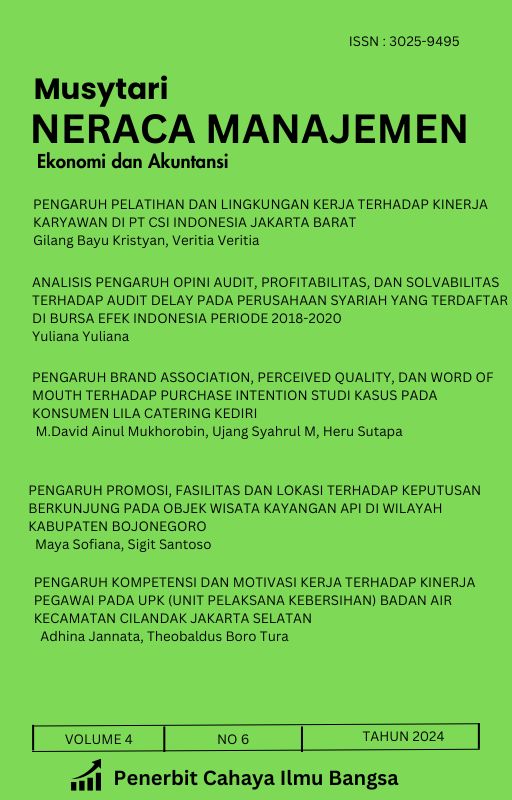TRANSFORMASI DIGITAL DALAM AKUNTANSI FORENSIK: TINJAUAN LITERATUR ATAS TEKNIK DETEKSI KECURANGAN BERBASIS TEKNOLOGI
Main Article Content
Abstract
Transformasi digital telah merevolusi praktik akuntansi forensik, terutama dalam mendeteksi dan mencegah kecurangan keuangan yang semakin kompleks. Penelitian ini melakukan tinjauan sistematis terhadap literatur terkini (2019–2024) mengenai teknik deteksi fraud berbasis teknologi dalam konteks akuntansi forensik digital. Metode yang digunakan adalah systematic literature review (SLR) dengan pendekatan kualitatif deskriptif melalui database seperti Scopus, ScienceDirect, dan Google Scholar. Hasil kajian mengidentifikasi empat tema utama: efektivitas AI dan machine learning dalam mendeteksi fraud, potensi blockchain dalam menjaga integritas data, meningkatnya adopsi teknologi pasca pandemi, serta tantangan implementasi terkait SDM dan infrastruktur. Studi ini menyimpulkan bahwa teknologi digital meningkatkan efisiensi dan akurasi deteksi kecurangan, namun masih menghadapi hambatan struktural. Temuan ini memberikan kontribusi teoretis dan praktis bagi pengembangan strategi audit forensik berbasis teknologi.
Kata kunci: akuntansi forensik, transformasi digital, deteksi kecurangan, artificial intelligence, machine learning, blockchain.
Abstract
Digital transformation has significantly reshaped forensic accounting practices, particularly in detecting and preventing increasingly complex financial fraud. This study conducts a systematic literature review (SLR) of recent studies (2019–2024) on technology-based fraud detection techniques in the context of digital forensic accounting. A qualitative descriptive approach was used, sourcing reputable academic journals from databases such as Scopus, ScienceDirect, and Google Scholar. The review identifies four key themes: the effectiveness of AI and machine learning in fraud detection, the potential of blockchain for ensuring data integrity, the growing adoption of digital technologies post-pandemic, and implementation challenges related to human resources and infrastructure. This study concludes that digital technologies enhance the efficiency and accuracy of fraud detection but still face structural and technical barriers. The findings provide both theoretical and practical insights for developing adaptive, technology-driven forensic audit strategies.
Keywords: forensic accounting, digital transformation, fraud detection, artificial intelligence, machine learning, blockchain.
Downloads
Article Details
Section

This work is licensed under a Creative Commons Attribution-NonCommercial-ShareAlike 4.0 International License.
How to Cite
References
ACFE. (2022). Report to the Nations: 2022 Global Study on Occupational Fraud and Abuse. Association of Certified Fraud Examiners. https://www.acfe.com/report-to-the-nations/2022/
Akter, S., Wamba, S. F., Gunasekaran, A., Dubey, R., & Childe, S. J. (2022). “Analytics-based decision-making for fraud detection”. Decision Support Systems, 154, 113699. https://doi.org/10.1016/j.dss.2021.113699
Alrawadieh, Z., Karaköse, M., & Yıldız, M. (2023). “Application of Artificial Intelligence in financial fraud detection: A bibliometric analysis”. Technological Forecasting and Social Change, 186, 122144. https://doi.org/10.1016/j.techfore.2022.122144
Dharma, I. G. N. E. R., & Riyanto, S. (2021). “Forensic accounting in the digital era: A systematic literature review”. International Journal of Financial Research, 12(4), 275–284. https://doi.org/10.5430/ijfr.v12n4p275
Handoko, B. L., Rosita, A., Ayuanda, N., & Budiarto, A. Y. (2022). “The impact of big data analytics and forensic audit in fraud detection”. 2022 12th International Workshop on Computer Science and Engineering (WCSE), 67–71. https://doi.org/10.18178/wcse.2022.06.011
Ketelaar, F., & Mićković, A. (2025). “Artificial intelligence in fraud detection: Textual analysis of 10-K filings”. Maandblad Voor Accountancy En Bedrijfseconomie, 99(2), 61–71. https://doi.org/10.5117/mab.99.132881
Moll, J., & Yigitbasioglu, O. (2019). “The role of internet technologies in the transformation of accounting: A review of the literature and future research directions”. Accounting & Finance, 59(2), 939–970. https://doi.org/10.1111/acfi.12291
Olubusola Odeyemi, Ibeh, C. V., Mhlongo, N. Z., Asuzu, O. F., Awonuga, K. F., & Olatoye, F. O. (2024). “Forensic accounting and fraud detection: A review of techniques in the digital age”. Finance & Accounting Research Journal, 6(2), 202–214. https://doi.org/10.51594/farj.v6i2.788
Ozturk, M., & Uzuner, Y. (2022). “Blockchain technology and forensic accounting: A new era in fraud detection”. Journal of Forensic and Investigative Accounting, 14(3), 329–348.
Snyder, H. (2019). “Literature review as a research methodology: An overview and guidelines”. Journal of Business Research, 104, 333–339. https://doi.org/10.1016/j.jbusres.2019.07.039
Tranfield, D., Denyer, D., & Smart, P. (2003). “Towards a methodology for developing evidence‐informed management knowledge by means of systematic review”. British Journal of Management, 14(3), 207–222. https://doi.org/10.1111/1467-8551.00375
Zhang, J., Xie, C., & Wang, G. (2020). “Detecting financial statement fraud using machine learning algorithms”. Computational Intelligence and Neuroscience, 2020, Article 5798349. https://doi.org/10.1155/2020/5798349
